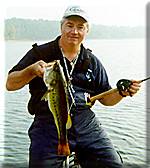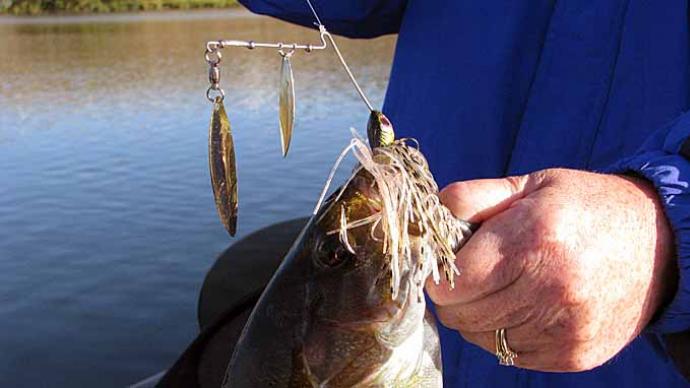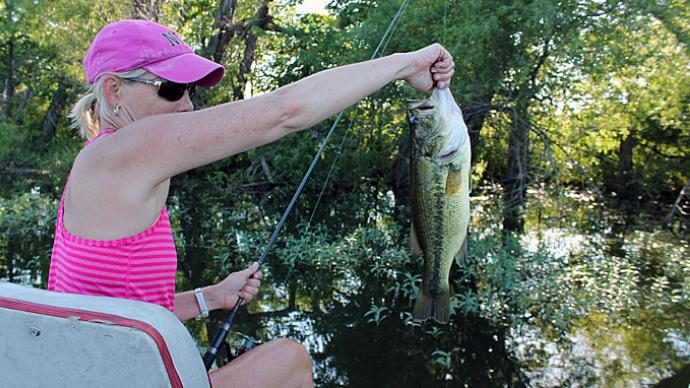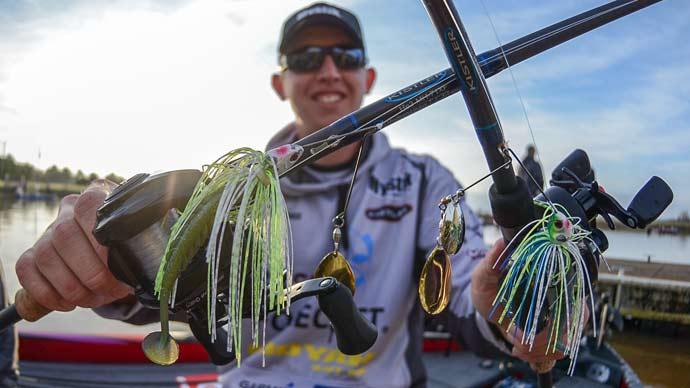
When I saw my first spinnerbait, I asked, "what kind of fish would be stupid enough to strike at a lure like this?" It did not take too long for me to find out! I caught a largemouth bass around 2 pounds the next day and was hooked on the concept.
Spinnerbaits come in many forms. Single, double, and triple-bladed versions are available with many replaceable skirt colors. This lure can be adapted for shallow and deep-water presentations by using lighter or heavier bodies. I often add weight, either wrapping lead wire around the lure or pinching large sinkers onto the wireframe to make it sink faster in very deep water.
Buzzbaits, while looking completely different from its cousin, the spinnerbait, also come with single double and triple rotating propellers, again offering interchangeable skirts for exciting topwater action.
I will deal with each lure individually to avoid confusion for the novice and talk about how these lures can be used. Even our more experienced anglers may find something here that will suit their favorite fishing hole the next time they "wet a line."
Spinnerbaits
Three important things I would like to let our readers know is that it does not have to be a windy day to throw a spinnerbait. I have used these lures with great success on calm days. The only difference is that I increase the retrieve rate, so the fish do not get a good look at the lure. Secondly, in weedy situations, do not use a trailer hook, as this will only cause the lure to snag, and you will spend more time cleaning weed or debris off the lure than fishing. I will only use trailers in open water situations. Finally, make sure all your hooks are constantly being sharpened. I carry a small file and stone for this specific purpose. You will thank me for reminding you, I promise!
Single-bladed spinnerbaits are often used in murky water conditions or for dusk and nighttime fishing. The single blade is often in the "spoon-like" Colorado style. This type of blade gives a tremendous amount of vibration in the water. As the bass have trouble seeing the lure due to water clarity or lack of daylight, they strike at this vibration and will track the spinnerbait with their lateral lines. I like black skirts for this application so that when the bass are almost on top of the lure, the color does not stop them from attacking the bait. I have found that light color skirts in dark water reduce the "hook-up" ratio.
Double-bladed baits are my go-to bait in clear, shallow conditions in the islands' lakes. Double-bladed lures vary in design. I have a lot of willowleaf-bladed combinations (these blades are shaped like a fish without a tail). They are mounted onto the lure frame with a smaller blade leading the lure and a larger blade following. This presentation mimics a medium-sized fish trying to catch a small one! Bass love to sneak up behind another fish in the act of hunting as in their mind, they think the attacking fish is concentrating so much on the chase that it will not see or sense the bass attacking from behind.
I have found that during spring and early summer, a small Colorado blade in front of the willow leaf blade will give added vibration to the flash of the willow leaf and get more attention. As the weather continues to warm, the double willow leaf combination emits a lot of flash from the sunlight, and a curious bass will attack these lures when fished at high speed in clear water. If the water is stained or muddy, a slower speed should be used. Triple-bladed spinnerbaits are just adding more "fish-like appeal" to the lure, and as there is a new selection coming to the market, it is something the bass in your area have perhaps not seen, so more hooks ups are possible.
Skirt color is a personal choice. I prefer orange and gold for shallow and clear water presentations, all white or white, and chartreuse for windy days and deeper water situations.
For all the combinations above, when I am fishing a moving body of water (and occasionally in very deep lakes), I like to make long casts and allow the bait to "helicopter" in a downward spiral, allowing the flow of the river to push the bait towards me on the retrieve gently. As you connect with the lure to begin the retrieval, the fish will strike the lure, so make sure you keep good contact with your lure at all times.
Buzzbaits
These are probably the most unusual of all the lures we cast for bass. I believe, like many others, that these lures imitate a rat, mouse, or a frog, scurrying along the surface of the water.
This is a big bass bait! I have seen colossal bass caught with this lure, but the presentation is critical to your success. First, you must "tune your buzzbait." This is accomplished in several different ways.
- Tying your lure to your driver-side wing mirror on your truck or car and allowing the blades to rotate as you drive. This high-speed action will (after a few miles!) make the lure squeak. If it is raining, so much the better! This squeak will enhance the attraction of the lure and certainly increase your chances of catching a bass.
- Drilling small holes in the propeller blades will increase the surface movement.
- Bending the arm of the bait downward to place the hook lower in the water. This will increase your hook-up ratio significantly.
- Removing the rivet casing that holds the blades in place so that they will turn erratically.
- Bending the body so that the lure returns when retrieving line in an arc rather than a straight line. I have said before that fish do not swim in straight lines, so why should your lures?
- Add a trailer hook but turn the barb downwards! It's sneaky, but it does increase the hook-up percentages in your favor!




